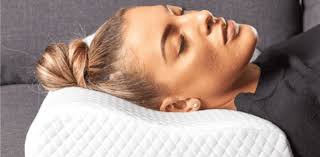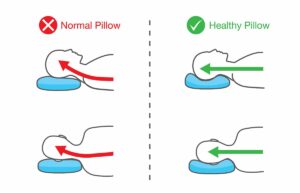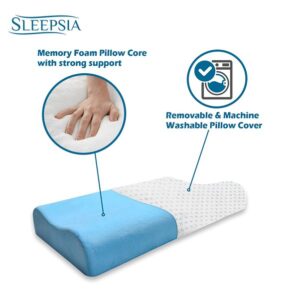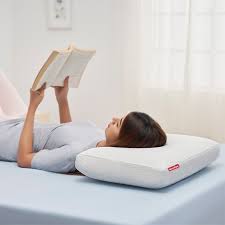

Neck strain is a common complaint, especially among those with poor sleeping habits or inadequate pillow support.
Memory foam pillows have gained popularity as a solution, offering comfort while reducing neck strain.
This article explores how and why memory foam pillows are effective, focusing on their unique properties, alignment benefits, and contributions to spinal health.
With scientific backing and real-life examples, we aim to provide a comprehensive understanding of how memory foam pillows can transform your sleep experience.
Article Index
- Introduction to Memory Foam Pillows
- What are memory foam pillows?
- Unique properties of memory foam.
- How Neck Strain Develops During Sleep
- Poor alignment and its consequences.
- The role of pillows in mitigating strain.
- Benefits of Memory Foam in Neck Support
- Pressure relief and contouring.
- Maintenance of spinal alignment.
- The Science Behind Memory Foam
- Material composition and responsiveness.
- Research-backed evidence on neck strain reduction.
- Real-Life Examples
- Case study 1: Improved neck strain in a desk worker.
- Case study 2: Better sleep quality for a side sleeper.
- Conclusion
- Why memory foam pillows are a game-changer for neck health.
Introduction to Memory Foam Pillows
Memory foam pillows have revolutionized the way we think about sleep comfort and spinal support.
Originally developed by NASA in the 1960s to enhance seat cushioning and crash protection for astronauts, memory foam—technically known as viscoelastic polyurethane foam—has since found its way into our bedrooms, and with good reason.
What sets memory foam apart is its incredible responsiveness to heat and pressure.
When you lay your head on a memory foam pillow, it gently molds to the contours of your neck and head, offering customized support that traditional pillows often fail to provide.
As your body heat softens the foam, it cradles the natural curves of your spine, helping reduce pressure points and muscle tension—especially important for those who suffer from neck stiffness or upper back discomfort.
Scientific studies on sleep ergonomics suggest that a well-designed memory foam pillow can improve sleep quality, especially for side and back sleepers.
By maintaining the alignment of the cervical spine, these pillows reduce the likelihood of waking up with neck pain or tension headaches.
Not all memory foam pillows are the same. You need to learn how to choose the right pillow for neck alignment.
Some are solid, while others are shredded or gel-infused to improve airflow and cooling.
For example, gel-infused memory foam pillows are particularly useful for hot sleepers, as they help dissipate heat more effectively throughout the night.
Take Sarah, a side sleeper who constantly woke up with a sore neck. Switching to a contoured memory foam pillow made a significant difference—her posture improved, and morning pain disappeared within weeks.
So, if you are tired of flipping your pillow or waking up feeling unrested, investing in a memory foam option might just be the supportive solution your neck has been dreaming of.
Personalized Neck and Spine Alignment
Memory foam’s adaptive nature allows it to distribute weight evenly across its surface, reducing pressure points that can cause discomfort or exacerbate neck strain.
For individuals struggling with neck pain, this feature ensures proper alignment of the neck and head with the spine, minimizing stress on the c2 cervical vertebrae during sleep.
Scientific Evidence:
A study published in Sleep Science (Schellen et al., 2014) demonstrated that participants using memory foam pillows experienced reduced cervical discomfort and improved sleep quality compared to those using conventional pillow materials.
The researchers attributed these benefits to memory foam’s ability to provide consistent and responsive support, which helps maintain neutral spinal alignment.
Example:
Laura, a stomach sleeper with chronic neck tension, found that a memory foam pillow adapted to her specific sleep position, relieving pressure on her cervical spine and reducing morning stiffness.
How Neck Strain Develops During Sleep?
Here is how it happens:
Poor Alignment and Its Consequences:
Neck strain often stems from poor sleeping posture, where the cervical spine is forced into unnatural positions due to inadequate support.
A pillow that is too high can tilt the head forward, compressing the neck muscles, while a flat pillow can hyperextend the neck, increasing strain on the vertebrae.
Over time, these misalignments lead to muscle tension, stiffness, and even tension headaches.
The Role of Pillows in Mitigating Strain:
Pillows serve as a vital support mechanism, bridging the gap between the head and mattress to maintain a neutral spine alignment.
Memory foam pillows are particularly effective as they contour to the head and neck, offering personalized support that adapts to sleeping positions.
For instance, a side sleeper can benefit from a higher loft memory foam pillow to fill the space between the shoulder and head, preventing neck tilt.
Emma’s Example:
Emma, a side sleeper, often woke up with a sore neck from using a flat pillow.
Switching to a memory foam pillow with a contoured design significantly improved her alignment, alleviating her discomfort within weeks.
Similarly, John, who sleeps on his back, found relief from his morning stiffness after using a low-loft memory foam pillow that supported the natural curve of his neck.
Benefits of Memory Foam in Neck Support
A quick look at the benefits:
Pressure Relief and Contouring:
Memory foam pillows excel in distributing weight evenly by conforming precisely to the unique shape of your neck and head.
This capability alleviates pressure on sensitive areas and reduces strain on the cervical spine.
Unlike traditional pillows that can flatten or lose their shape over time, memory foam maintains its structure, offering consistent support throughout the night.
This ensures that users wake up with fewer aches and less stiffness.
Maintenance of Spinal Alignment:
Proper spinal alignment is essential for preventing and alleviating neck pain.
Memory foam pillows are designed to cradle the natural curve of the cervical spine, providing support regardless of whether you sleep on your back, side, or stomach.
A study published in the Journal of Manipulative and Physiological Therapeutics (Gordon et al., 2009) highlighted that memory foam pillows significantly improve spinal alignment when compared to polyester and feather options, reducing the risk of musculoskeletal discomfort.
Material Composition and Responsiveness:
Memory foam is a viscoelastic material that uniquely responds to both pressure and heat.
When you lie down, your body heat softens the foam, enabling it to contour to your neck and head.
This adaptive support system minimizes movement and reduces the need for repositioning during sleep.
By providing a stable and custom fit, memory foam decreases stress on the cervical spine, helping prevent chronic neck strain and improving overall sleep quality.
Research-Backed Evidence on Neck Strain Reduction
Memory foam pillows are more than just a cozy addition to your bedding—they are backed by science when it comes to reducing neck strain and improving sleep quality.
Multiple studies have confirmed that using the right pillow can positively influence spinal alignment and reduce cervical discomfort.
Study #1: One widely cited study compared memory foam, feather, and orthopedic pillows and found that orthopedic and memory foam options performed better in maintaining proper neck posture and comfort. Participants who used memory foam reported fewer instances of waking up with stiffness or soreness.
Study #2: Another research project tested different pillow shapes and found that memory foam, especially in rectangular or contoured cylindrical designs, helped reduce muscle activity and strain in the neck during rest. This means your neck muscles can actually relax instead of working overtime to compensate for poor support.
Study #3: In a study involving athletes with chronic neck pain, specialized cervical pillows (many of which use memory foam) significantly improved pain symptoms and sleep quality. Researchers also observed a noticeable increase in mobility and reduced morning discomfort after consistent use.
Study #4: As per BestForwardHeadPostureFix research team, “A broader review of pillow materials and designs confirmed that height, firmness, and contouring all contribute to better spinal alignment during sleep. Memory foam pillows often score high across all these factors, making them a top choice for long-term neck support”.
Classic Example: Take Jane, a side sleeper who used to wake up with sharp neck pain. After switching to a contoured memory foam pillow, her symptoms eased within a week—and her sleep felt more restful and uninterrupted.
These studies and real-life experiences confirm one thing: choosing a well-designed memory foam pillow is not just about comfort—it is a smart investment in your spinal health.
Daniel’s Path to Comfort and Better Sleep
Daniel, a 40-year-old software engineer, struggled with persistent neck pain and stiffness due to hours spent working at his computer.
His old feather pillow lacked proper support, leaving his neck in awkward positions throughout the night.
Frustrated with restless sleep and morning discomfort caused by forward neck, Daniel decided to try a memory foam pillow with cervical contouring.
Within just a month of consistent use, he noticed significant relief.
The pillow’s ability to mold to the natural curve of his neck reduced pressure points and promoted proper spinal alignment.
Sophia’s Side-Sleeping Transformation
Sophia, a 45-year-old nurse and side sleeper, often woke up with neck and shoulder pain.
Her traditional pillow caused her head to sink unevenly, leading to poor alignment of her cervical spine.
After researching alternatives, she invested in a contoured memory foam pillow designed for side sleepers.
The pillow’s ergonomic design provided stable support, keeping her head, neck, and shoulders aligned throughout the night.
Over time, Sophia not only experienced less discomfort but also reported more restful and uninterrupted sleep.
These real-life examples demonstrate the effectiveness of memory foam pillows in addressing different sleep challenges.
By supporting proper alignment and reducing strain, they offer a simple yet impactful solution for individuals seeking better sleep and reduced neck pain.
Conclusive Analysis
Memory foam pillows provide a proven remedy for neck strain by merging unparalleled comfort with ergonomic support.
These pillows excel in relieving pressure by evenly distributing weight and contouring to the natural shape of the head and neck.
Their ability to maintain spinal alignment across various sleep positions ensures reduced strain on cervical muscles and joints, promoting long-term neck health.
Research in sleep science consistently highlights their effectiveness in alleviating discomfort and improving sleep quality.
With benefits supported by science, memory foam pillows are not just a luxury but a practical investment for enhanced sleep, reduced pain, and overall well-being.
References:


